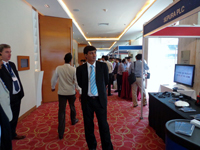|
The TETRA + Critical Communications Association held a number of events in Asia towards the end of last year. Alun Lewis was at the conference and exhibition in Mumbai to see how TETRA has evolved in India over the last decade
The start of November last year saw the TCCA host a one day conference and exhibition in Mumbai, India – before moving on to host similar events later in the month in Kuala Lumpur and Jakarta. With India currently investing heavily in many new and substantial infrastructure projects in transport, security and industry, TETRA looks like building on its already established success in the country. Subodh Vardhan, managing director at Motorola Solutions India, one of the exhibitors at the event, commented: “From the first Indian TETRA network in 2002 for Delhi Metro to the TETRA network for the world’s largest grassroots refinery in Jamnagar to the city wide TETRA Government Radio Network in Delhi, TETRA has evolved over the past decade in India. While TETRA solutions in India continue to gain fast traction in large business critical enterprise domains like metros, airports and oil and gas, one sector that has still not been an active participant in the TETRA growth evolution in India is public safety. With a population of more than 1.2 billion, spread across 28 states, public safety is a challenging subject of paramount importance in this country. Natural and man-made disasters add to the complexity of this problem.” Mr Vardhan – along with some other speakers – also emphasised the challenges that lay ahead for the TETRA community: “In a spectrum starved country like India, TETRA presents a spectrum efficient secured mission critical communication platform coupled with a truly open standard, interoperability and a multi-vendor ecosystem. Though slowly, public safety agencies are taking steps to migrate from their legacy analogue communication systems to advanced digital TETRA radio trunking systems. Some of the key challenges they are facing are regulatory and licensing issues, lack of funds and impetus for police communications modernization. With public safety being the key elusive frontier to conquer, TETRA is a state-of-the art technology solution that can help make cities in India safer.” Ehud Weizman, head of sales for Cassidian’s public safety operations on the Indian Subcontinent, also sees substantial investment in both infrastructure development and homeland security: “Central and state agencies are drawing up plans to enhance public safety while TETRA solutions are being actively considered across states in India for end-use by police forces, airports, oil refineries and metro-rail networks. As a result, I anticipate the market for TETRA solutions to grow in India in the coming years with the transport sector, public safety and security especially in the big cities, and critical infrastructure such as the oil and gas sectors being particularly promising growth segments.” Cassidian also used the event to announce details of a new contract it had won with the Jaipur Metro Rail Corporation, a major project involving the building of elevated and underground mass transit infrastructure for the city. As the system and technology supplier, Cassidian will provide its DXT3c switch with five TETRA base stations (TB3), Network Management Software (NMS) and an Automatic Vehicle Location (AVL) service. In addition, 350 specialised TETRA radios will be deployed on the trains. Cassidian will also be in charge for training and onsite technical support services and will join forces with the system integrator, Fibcom India, to meet the special needs of metro operations of the Jaipur Metro Rail Corporation (JMRC). This focus on transport was echoed by Paul Ward, international sales director at Etelm. “Although TETRA was originally developed as a standard for secure public safety and security systems, in the case of transportation, the communications needs of the railway, bus or metro users differ greatly from that of public safety – however this sector has also benefited greatly from the fact that TETRA offers advanced secure data and emergency voice call capability on the same network. Indeed transport users generally want to maximise the data and minimise voice by automating signalling and communications wherever possible, only using voice by exception. TETRA can provide advanced data and integration to other signalling systems, and provide secure, high quality audio communications for emergency or priority situations.” Mr Ward added: “In addition, even where certain industries such as railways are historically standardised on GSM-R technology, they are fast realising that by its very nature TETRA can provide more advanced features, far more cost effectively. TETRA has the capacity for a high density of simultaneous communications – ideal for train stations and major hubs where the volume of communications channels increases dramatically. This is particularly important in India which has some of the largest railway hubs in the world. The fact that TETRA has a wider market has meant that the technology has advanced more rapidly whilst at the same time the costs have reduced.”
|

